A Deep Dive into the Top 8 Business Management Software Solutions and Their Distinct Features
In the ever-evolving world of small to medium-sized businesses (SMBs), the importance of efficient, comprehensive business management software cannot be overstated. These tools are the backbone of modern business operations, enabling SMBs to streamline processes, boost productivity, and enhance decision-making through data insights. With the right software, businesses can manage everything from sales and customer relationships to payroll, projects, and beyond, all while saving time and reducing errors.

This blog delves into the competitive world of business management software, with a spotlight on Skhokho, a platform designed to cater specifically to the needs of SMBs. We'll compare Skhokho's offerings to those of its competitors, exploring what sets it apart and why it might be the best choice for your business. Key areas we'll cover include:
- The Current Landscape of Business Management Software
- Skhokho
- Monday.com
- Asana
- Zoho
- Trello
- Salesforce
- QuickBooks
- Slack
- A dynamic comparison of the functionalities across different business software
The Current Landscape of Business Management Software
The landscape of business management software is both vast and dynamic, reflecting the evolving needs of businesses across industries. In this digital age, where efficiency and agility are paramount, the market for business management solutions has grown exponentially. These platforms are designed to cater to a myriad of operational needs, including project management, customer relationship management (CRM), human resources (HR), payroll, and more. As businesses strive to streamline processes and enhance productivity, the demand for comprehensive, all-in-one software solutions has surged.

Necessity for Innovation and Integration
Innovation is the lifeblood of the business management software market. As businesses evolve, so too do their needs, driving demand for solutions that not only address current challenges but are also flexible enough to adapt to future requirements. The integration of AI and machine learning technologies has been a game-changer, enabling software solutions to offer predictive analytics, automate routine tasks, and provide more personalized experiences for users and customers alike.
Integration capabilities are equally critical. In today's complex digital ecosystem, businesses use a multitude of applications and services to manage different facets of their operations. The ability of business management software to seamlessly integrate with other tools—such as accounting software, email marketing platforms, and communication tools—enhances its value immensely. Integration eliminates the need for manual data entry between systems, reduces the likelihood of errors, and provides a more unified view of business operations.
Skhokho: The All-In-One Business Management Solution
Skhokho is a revolutionary Business Software as a Service (SaaS) designed to streamline the operations of small to medium-sized businesses. It distinguishes itself from the competition by offering an extensive suite of functionalities within a single, integrated platform. This comprehensive system supports businesses in managing day-to-day tasks, fostering growth, and enhancing efficiency across various functions.
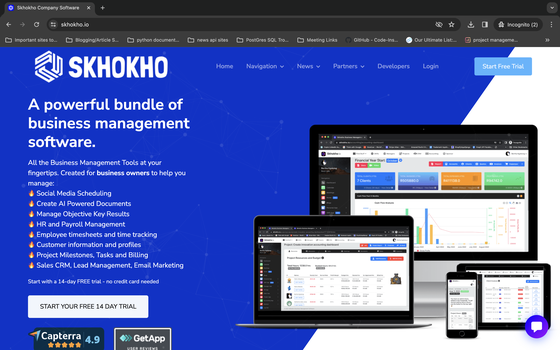
**Functionalities Offered by Skhokho:**
- AI-Powered Documents: Utilizing advanced artificial intelligence, Skhokho automates the creation of essential documents. This not only accelerates the document generation process but also ensures consistency and accuracy across all business communications and reports.
- Objective Key Results (OKR) Management: Skhokho’s OKR management tools empower businesses to define clear objectives and measurable results, fostering a culture of goal orientation and performance measurement. This strategic planning feature helps align team efforts with the company's vision and growth targets.
- HR and Payroll Management: The HR and payroll management functionality simplifies complex HR processes, from recruiting and onboarding to payroll processing and leave management. It provides a centralized database for all employee information, making management tasks more efficient and compliant with regulatory standards.
- Employee Timesheets and Time Tracking: This feature enables accurate tracking of employee work hours and project time allocation. It's essential for managing payroll, analyzing productivity, and optimizing workforce allocation across various projects and tasks.
- Customer Information and Profiles: With Skhokho’s CRM features, businesses can maintain comprehensive customer profiles, track interactions, and manage customer data efficiently. This enhances customer relationship management and enables personalized service and marketing strategies.
- Project Management: Skhokho’s project management tools offer end-to-end project oversight, from initiation and planning to execution and closure. Users can set milestones, assign tasks, track progress, and manage budgets, ensuring projects are completed on time and within scope.
- Sales CRM, Lead Management, and Email Marketing: This integrated suite of sales and marketing tools helps businesses capture leads, manage sales pipelines, and execute effective email marketing campaigns. It’s designed to boost sales performance and customer engagement through targeted communication and lead nurturing.
- Manager App: The Manager App is a distinctive feature that provides managers with mobile access to team information, task assignments, and project updates. It allows for real-time decision-making and team management, ensuring that managers stay connected and informed, no matter where they are.
In addition to these features, Skhokho enhances business operations with its seamless integration capabilities. It offers native integration with essential tools like Zapier, Google Calendar, and SAGE Accounting, alongside a secure API for custom integrations. This connectivity allows businesses to link Skhokho with thousands of other applications, creating a truly interconnected work environment.
Monday.com
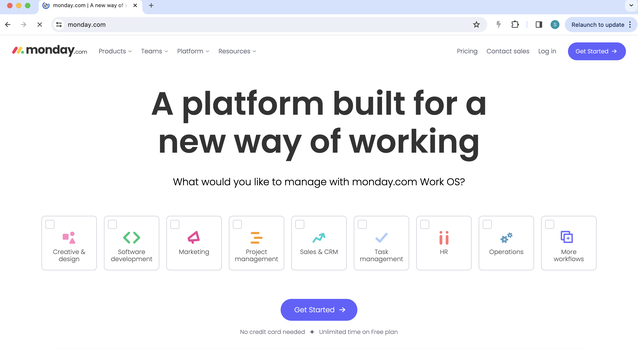
Monday.com is a highly customizable work operating system (Work OS) that enables teams to create their applications and work management software. It's known for its flexibility, user-friendly interface, and the ability to adapt to a myriad of work processes and tasks. Key features include:
- Customizable Workflows: Users can tailor workflows to their specific needs, making it suitable for a wide range of projects and industries.
- Collaboration Tools: It offers robust collaboration features, including shared boards, real-time updates, and communication tools integrated directly into the workflow.
- Visual Project Management: With a variety of view options like Kanban, Gantt, and calendar, Monday.com excels in providing visual project tracking.
- Automation: Monday.com allows users to automate routine tasks, reducing the need for manual intervention and increasing efficiency.
What Monday.com Does Not Have
Monday.com, while renowned for its project management and team collaboration capabilities, lacks several advanced features that cater to the comprehensive needs of modern businesses, particularly in the realm of automating and integrating complex processes. To mention the few:
- AI-Powered Documentation: Monday.com does not have the AI-powered documentation feature, which significantly aids businesses in generating project-based documents. This technology streamlines the creation of reports, proposals, and other essential documents by automating the process, enhancing both efficiency and accuracy.
- Objective Key Results (OKR) Management: The platform does not offer dedicated tools for managing Objective Key Results (OKRs), which are essential for setting, tracking, and achieving strategic goals. OKR management helps align team efforts with the organization's long-term vision and performance targets.
- Comprehensive Sales CRM and Lead Management: While Monday.com can be adapted for sales tracking and customer relationship management, it does not inherently possess a comprehensive suite of sales CRM and lead management tools designed to capture leads, manage sales pipelines, and execute targeted email marketing campaigns directly linked to project outcomes.
Asana
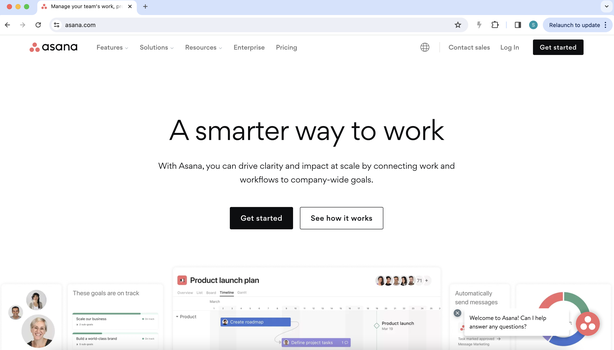
Asana is a popular project management tool designed to help teams organize, track, and manage their work. It's celebrated for its intuitive design, ease of use, and ability to facilitate team collaboration and project tracking. Key functionalities include:
- Task Management: Asana enables users to create tasks, assign them to team members, set deadlines, and track progress.
- Project Visualization: Offers multiple views (list, board, timeline, calendar) to visualize projects and tasks, helping teams stay organized and on track.
- Team Collaboration: Features like comments, task assignments, and notifications enhance team communication and collaboration.
- Integrations: Asana integrates with various apps and tools, enhancing its functionality and allowing teams to connect workflows across platforms.
What Asana Does Not Have
While Asana is a powerful tool for project management and team collaboration, It doesn't offer a broader range of business management features and excels in areas of integration and flexibility:
- Advanced Integration Capabilities: There is no native integration with tools like Zapier, Google Calendar, SAGE Accounting. This connectivity ensures businesses can easily link their various operations and workflows without the need for extensive customization or third-party add-ons.
- Customization and Flexibility: While Asana offers a high degree of task and project customization, unfortuately it does not provide businesses with the flexibility to manage a wider array of operations, including financial management, customer relationships, and employee tracking, all tailored to the needs of many SMBs.
- AI-Powered Features: The AI-powered document creation is a standout feature that offers significant time savings and efficiency improvements, automating a task that remains manual and time-consuming in many other platforms, including Asana.
Zoho
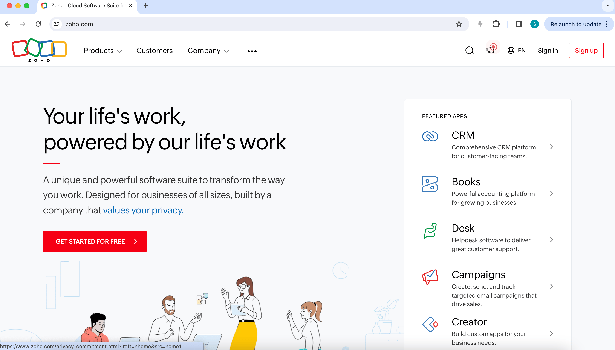
Zoho offers a comprehensive suite of online productivity tools and SaaS applications designed to support businesses of all sizes. Known for its wide array of services, Zoho caters to various business needs, including CRM, project management, email marketing, invoicing, and more. Its target market spans from small businesses to large enterprises, with solutions designed to be scalable and customizable to a company's specific needs. Zoho's key selling points include:
- Extensive Product Suite: Offers more than 40 applications covering almost every aspect of business management.
- Customization and Scalability: Highly customizable solutions that can grow with a business, making it suitable for a broad audience.
- Integrated Solutions: Zoho's products are designed to work seamlessly together, offering an integrated experience for users.
What Zoho is Lacking
While Zoho provides a vast ecosystem of business tools, Skhokho brings its own unique advantages, especially in terms of customization and user support:
- WhatsApp Integration for Task Management: Despite Zoho's extensive suite of business tools, it does not offer integration with WhatsApp for managing tasks and communications. This feature could significantly enhance accessibility and convenience for teams needing to stay connected and manage tasks on the go.
- AI-Powered Documentation: Zoho does not have an AI-powered documentation feature to automate and streamline the generation of business documents, which can lead to increased efficiency and consistency in document creation.
- Comprehensive Sales CRM and Lead Management Directly Linked to Projects: While Zoho provides robust CRM capabilities, it may lack the direct linkage of sales CRM and lead management tools to specific projects within its platform, potentially missing out on a unified view of project outcomes and sales efforts.
Trello

Trello is a web-based, Kanban-style, list-making application that's highly valued for its simplicity and visual project management approach. Its user interface is intuitive, making it easy for teams to collaborate, organize tasks, and track project progress. Trello's main strengths include:
- Visual Organization: Trello's board and card system is designed for visual task management, allowing users to easily organize projects and daily tasks.
- Simplicity and Ease of Use: The platform is known for its straightforward design, making it accessible to users with varying levels of technical skill.
- Flexibility: Trello's boards are highly customizable and can be used for a wide range of applications, from project management to personal organization.
What Trello is Missing in Comprehensive Project Management Features
Trello's streamlined focus on task and project organization, but it doesn't offer more comprehensive project management features such as:
- Integrated Project Management Tools: a full suite of project management tools, including milestones, tasks, billing, and time tracking, all integrated within a single platform. This comprehensive approach addresses the needs of businesses looking for more than just task organization.
- Beyond Visual Task Management: While Trello excels in visual organization, It does not extend its functionality to include detailed project planning, resource allocation, and performance tracking, offering a more rounded solution for project management.
- Its disadvantage in AI-powered features, integrated HR and payroll management position it as a least preferable choice for businesses seeking an all-in-one platform to manage their operations efficiently and effectively.
Salesforce
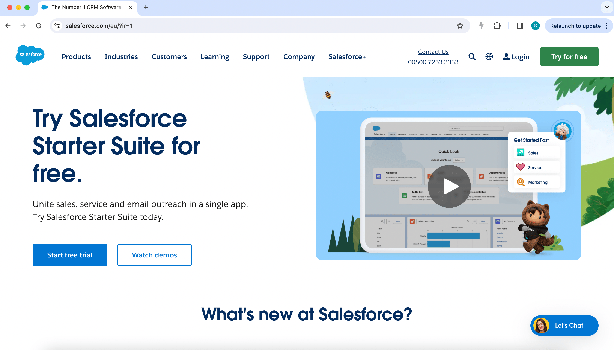
Salesforce is a global leader in customer relationship management (CRM) software, offering a comprehensive suite of services designed to manage customer information, sales leads, and marketing campaigns. Its key features include:
- Advanced CRM Features: Salesforce provides a robust platform for tracking customer interactions, managing leads, and automating sales processes.
- Customizability and Scalability: The platform is highly customizable, allowing businesses to tailor it to their specific sales and marketing needs. It's also scalable, suitable for both small businesses and large enterprises.
What Salesforce Does Not Have
Salesforce, while a powerhouse in CRM and sales management, often presents a complex and feature-rich environment that can be overwhelming for small to medium-sized businesses (SMBs). This complexity might not always align with the straightforward needs or resource capabilities of these smaller enterprises. In contrast, some platforms opt for a more streamlined approach, simplifying the process of managing leads and opportunities. They provide a unified system where every aspect of a sales opportunity, from the initial referral to the closing of the deal, can be managed in one place. This encompasses the tracking of detailed information, contacts, expenses, meetings, documents, and notes associated with each opportunity.
Additionally, the capability to use one's own mailing credentials for email communications is often missing, a feature that could offer a more personalized and authentic touch to customer interactions, potentially boosting the credibility and effectiveness of sales campaigns. The absence of an all-in-one CRM tool that integrates seamlessly with other business functions also means businesses may find it challenging to manage their sales funnel and customer relationships efficiently within a single platform.
Moreover, for SMBs, the value proposition of a more integrated and simplified system could be far more appealing, potentially offering a broader range of functionalities at a more accessible price point than specialized CRM solutions. This integrated approach not only makes it easier for businesses to manage their operations but also can be more cost-effective, avoiding the need for multiple, separate software subscriptions.
QuickBooks

QuickBooks is widely regarded as a leading accounting software for small to medium-sized businesses, offering features for bookkeeping, invoicing, payroll, and financial reporting. Its strengths include:
- Comprehensive Accounting Tools: Designed to streamline the accounting process, offering functionalities like expense tracking, invoice creation, and financial report generation.
- Ease of Use: QuickBooks is known for its user-friendly interface, making it accessible for business owners and non-accountants.
- Integration Options: While it offers integration with a range of apps, its focus remains on financial management.
What QuickBooks Does Not Have
QuickBooks primarily focuses on financial transactions and record-keeping, which may limit its utility for businesses seeking a broader, more integrated approach to managing their operations beyond just accounting.
Unlike some platforms, QuickBooks does not offer a direct integration with broader business management or operational tools like SAGE Accounting within a unified platform. This lack of seamless integration can present challenges for businesses aiming to manage their finances in tandem with other key business operations, such as project management, HR, and sales, within a single, cohesive system.
Furthermore, QuickBooks is designed as a dedicated accounting tool, which means it might not provide the additional functionalities that come with a more integrated business management software. Features such as managing client lists, business products and services, and providing comprehensive analytics and reporting across all areas of the business are often sought by businesses looking to streamline their processes. The need for a lightweight, more versatile accounting management solution that simplifies financial record-keeping and integrates with other business functions can be critical for small businesses aiming for efficiency and growth without the complexity of using multiple tools.
Slack
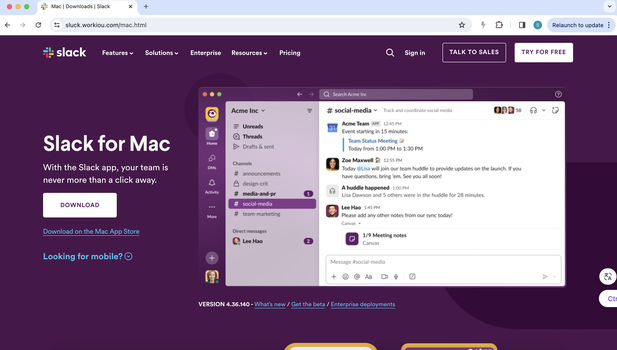
Slack is a popular communication platform designed to facilitate team collaboration through messaging, file sharing, and integration with a wide range of productivity apps. Its key features include:
- Instant Messaging and Channels: Allows for real-time communication and collaboration, with the ability to organize conversations into channels.
- Integration with Other Tools: Slack integrates with many third-party applications, centralizing communication and workflows.
What Slack Does Not Have (Integrating Communication with Project and Task Management)
Slack, a prominent platform for team communication and collaboration, excels in facilitating real-time conversations, file sharing, and integration with numerous productivity tools. Its strength lies in creating a digital workspace where teams can communicate efficiently, organize conversations into channels, and connect with external applications to streamline workflows. However, Slack's primary focus on communication means it lacks integrated project and task management tools that are embedded within some comprehensive business management platforms.
Specifically, Slack does not offer an integrated meeting management feature that allows users to organize, record, and follow up on meetings directly within the context of their projects. In environments where project management and team collaboration are closely intertwined, the absence of such features means that meeting details, minutes, and action items may need to be managed separately or through additional plugins, potentially leading to fragmented communication and information silos.
Furthermore, while Slack integrates with a wide array of third-party applications to enhance its functionality, it does not natively support direct integration with WhatsApp for task management and communication. This limitation can affect teams that rely on WhatsApp for quick, informal communications or for managing tasks on the go, as they would need to switch between apps to communicate and manage project tasks effectively.
In essence, while Slack provides a robust platform for team communication, its focus on this area means it may not fully cater to the needs of businesses looking for a more integrated solution that combines project management, meeting organization, and task communication within a single, cohesive platform.
A Table Comparing The Functionalities Across Different Business Software:
| Skhokho | Monday.com | Asana | Zoho | Trello | Salesforce | QuickBooks | Slack | ||
|---|---|---|---|---|---|---|---|---|---|
| 1 | AI-Powered Document Creation | YES | NO | NO | NO | NO | NO | NO | NO |
| 2 | Integrated OKRs Management | YES | NO | NO | YES | NO | NO | NO | NO |
| 3 | Comprehensive HR & Payroll System | YES | NO | NO | YES | NO | NO | YES | NO |
| 4 | Advanced Project Management Features (project milestones, tasks, billing, resource allocation) | YES | YES | YES | YES | YES | NO | NO | NO |
| 5 | Sales CRM and Email Marketing Integration | YES | NO | NO | YES | NO | YES | NO | NO |
| 6 | Native Integration and API Connectivity | YES | YES | YES | YES | YES | YES | YES | YES |
| 7 | Accessibility through WhatsApp | YES | NO | NO | NO | NO | NO | NO | NO |
| 8 | FAQ Chatbot | YES | NO | NO | YES | NO | YES | NO | NO |
In reviewing the functionalities across various business management platforms, it's evident that Skhokho emerges as a leading contender in providing a comprehensive suite of tools designed for small to medium-sized businesses. The comparison table highlights Skhokho's unique position in offering a broad range of features, including AI-powered document creation, integrated OKRs management, a comprehensive HR & payroll system, advanced project management capabilities, and much more. Unlike its competitors, Skhokho offers unparalleled native integration and API connectivity, accessibility through WhatsApp, and an FAQ chatbot, ensuring that businesses have all the tools they need to streamline operations, enhance productivity, and foster growth within a single platform.
This extensive functionality set places Skhokho at the forefront of the business management software market, making it an ideal choice for businesses seeking a robust, all-in-one solution. Its ability to address the multifaceted needs of modern businesses, combined with the simplicity and efficiency of its platform, positions Skhokho not just as a software solution but as a strategic partner for SMBs looking to navigate the complexities of today's business landscape successfully.
Call to Action
Are you ready to take your business management to the next level? We invite you to experience the power of Skhokho firsthand by signing up for our 14-day free trial. Discover how our comprehensive suite of tools can transform your business operations, with no obligation and no credit card required. Your journey towards streamlined efficiency, enhanced productivity, and accelerated growth starts with Skhokho.
Embrace the future of business management with Skhokho—where innovation meets efficiency. Try Skhokho today and see the difference for yourself.

Skhokho User Support and Resources
A standout feature that significantly enhances the user experience of any business management software is the quality and availability of user support and resources. Skhokho recognizes this aspect as critical to the successful adoption and effective use of its platform. Below are the key components of Skhokho's approach to user support and resources, showcasing its commitment to providing exceptional service and support to its users:
- Documentation: https://skhokho.io/documentation/guide/
- Tutorial Videos: https://www.youtube.com/channel/UCEUBXG1R5YzUmuvGaJP9KYA
- Chatbot for FAQs: Skhokho's integration of a chatbot for handling frequently asked questions (FAQs) exemplifies its commitment to providing timely and efficient user support. This AI-powered chatbot is accessible 24/7, offering instant responses to common queries and issues.
Pricing and Accessibility
Unlike some competitors that may charge per user or feature, leading to potentially high costs as a business grows, Skhokho aims to offer scalable pricing tiers. These tiers are structured to provide access to the full range of functionalities without imposing limits on the number of users or essential features. This approach ensures that businesses of all sizes can access the tools they need without worrying about escalating costs.
One of the most compelling aspects of Skhokho's approach to attracting new users is the offering of a 14-day free trial, which does not require credit card information. For more information on their pricing structure, visit their Pricing Page.









